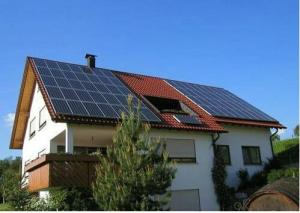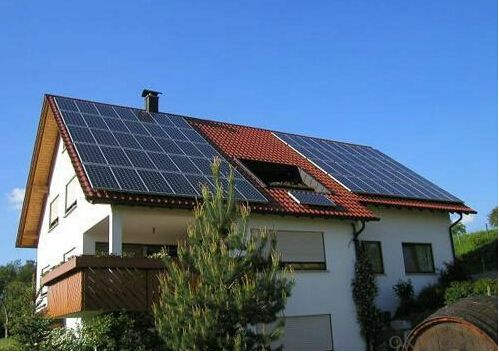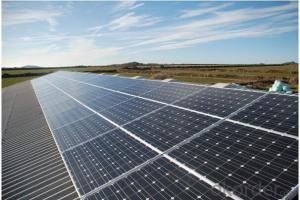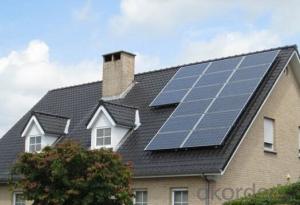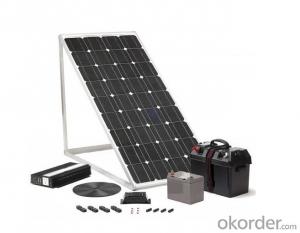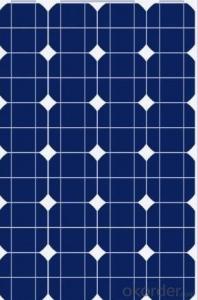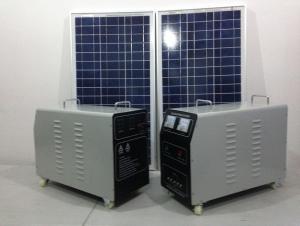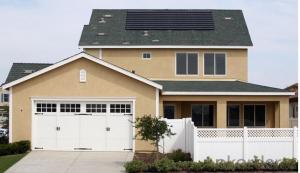Solar Energy Systems Companies' 500W Solar System Made in China
- Loading Port:
- China Main Port
- Payment Terms:
- TT OR LC
- Min Order Qty:
- -
- Supply Capability:
- -
OKorder Service Pledge
Quality Product, Order Online Tracking, Timely Delivery
OKorder Financial Service
Credit Rating, Credit Services, Credit Purchasing
You Might Also Like
- Q: What is the role of solar energy systems in reducing heat island effect?
- Solar energy systems play a crucial role in reducing the heat island effect by capturing and utilizing the sun's energy for electricity generation. By relying on renewable energy sources like solar power, we can reduce the reliance on fossil fuels and decrease the heat generated from traditional energy production methods. Additionally, solar panels help to absorb and convert sunlight into electricity, which reduces the amount of heat that is reflected back into the environment. This not only helps to mitigate the urban heat island effect but also contributes to overall climate change mitigation efforts.
- Q: Can solar energy systems be financed or leased?
- Certainly, it is possible to finance or lease solar energy systems. Various companies provide financing choices for individuals and enterprises interested in installing solar panels and similar energy systems. These financing alternatives enable customers to divide the system's cost over a specific duration, thus rendering it more economically feasible. Furthermore, leasing arrangements are attainable whereby a third-party company owns and maintains the solar panels, and the customer pays a monthly fee to lease the system. Consequently, such financing and leasing alternatives have enhanced the accessibility of solar energy to a broader spectrum of individuals, significantly contributing to the rapid expansion of the solar industry in recent years.
- Q: Can solar energy systems be used for water heating in swimming pools?
- Yes, solar energy systems can be used for water heating in swimming pools. Solar panels can be installed to capture the sun's energy and heat the water in the pool, providing an eco-friendly and cost-effective solution for pool heating.
- Q: Are there any regulations or permits required for installing solar energy systems?
- Solar energy systems require regulations and permits for installation. The specific requirements vary depending on the location and jurisdiction, as regulations are set at local, state, and national levels. These regulations and permits are in place to ensure the safety of solar energy system installations, compliance with building codes, and adherence to local zoning requirements. Typically, a solar energy system installation requires a building permit. This permit guarantees that the installation is done correctly and follows all necessary safety guidelines. The permit process involves submitting detailed plans and documentation, including structural engineering reports and electrical diagrams. The local building department reviews these documents to ensure compliance with applicable codes and regulations. In addition to building permits, there may be other permits or approvals necessary for solar energy systems. These could include electrical permits, zoning permits, or even historic preservation approvals in certain areas. It is crucial to consult with the relevant authorities and obtain all necessary permits before installing a solar energy system to avoid legal or safety issues. Furthermore, some jurisdictions have specific regulations regarding the size, placement, and design of solar energy systems. These regulations aim to preserve the aesthetics of the area and ensure that the systems do not pose any risks or nuisances to neighboring properties. It is important to note that regulations and permit requirements are constantly changing and can differ significantly from one jurisdiction to another. Therefore, it is advisable to consult with local authorities or hire a professional solar energy installer who is familiar with the local regulations to ensure compliance throughout the installation process.
- Q: Can solar energy systems be used for powering outdoor signage?
- Yes, solar energy systems can be used to power outdoor signage. Solar panels collect sunlight and convert it into electricity, which can then be used to power various electrical devices, including outdoor signage. This renewable energy source offers a sustainable and cost-effective solution for powering signage in areas where access to the electrical grid may be limited or expensive. Additionally, solar energy systems can help reduce carbon emissions and contribute to a greener environment.
- Q: How much maintenance is required for a solar energy system?
- Solar energy systems typically require minimal maintenance. Regular cleaning of the solar panels to remove dust and debris is recommended to ensure optimal performance. Additionally, checking the system's components, such as inverters and wiring, at least once a year is advisable. Overall, solar energy systems are designed to be durable and reliable, requiring little ongoing maintenance.
- Q: Can solar energy systems be used in powering music studios or recording studios?
- Certainly, music studios or recording studios can definitely utilize solar energy systems for power. Solar power systems present a clean and renewable energy source that offers a reliable and economical solution for operating various electrical equipment, including the energy-intensive equipment typically found in music studios. To harness sunlight and convert it into electricity, solar panels can be installed on the studio building's roof or any other suitable area. This generated electricity can then effectively power a diverse range of equipment, such as amplifiers, mixers, microphones, computers, lighting fixtures, and air conditioning systems. The required size of the solar power system will depend on the studio's energy needs. By analyzing the studio's energy consumption patterns and demands, solar energy experts can design and install a tailor-made solar power system that perfectly suits the studio's specific requirements. One major advantage of utilizing solar energy in music studios is the potential for significant cost savings. Traditional electricity sources, especially in commercial settings, can be quite expensive. However, by generating their own electricity through solar power, studios can reduce their reliance on the grid and potentially diminish their electricity bills. Furthermore, solar energy is an environmentally friendly and sustainable option. Music studios often consume a substantial amount of electricity, and using solar power can help minimize their carbon footprint and contribute to a more environmentally conscious future. It is important to note that solar energy systems can also be combined with battery storage systems. This allows music studios to store excess energy produced during the day and utilize it during periods of low solar generation or at night. This further enhances the reliability and independence of the solar power system. In conclusion, solar energy systems can be effectively employed to power music studios or recording studios. They provide a clean, renewable, and cost-effective solution that can meet the energy demands of these facilities while simultaneously reducing their environmental impact.
- Q: How does the efficiency of solar panels vary between manufacturers?
- The efficiency of solar panels can differ significantly among manufacturers as a result of various factors. One primary factor is the quality of materials used during production. Panels made with high-quality materials, like monocrystalline silicon, generally exhibit higher efficiency compared to those made with lower-quality materials. Manufacturers also employ diverse manufacturing processes that can impact panel efficiency. For instance, some manufacturers utilize more advanced and precise techniques, resulting in higher efficiency panels. Moreover, the level of experience and expertise of the manufacturer can also influence panel efficiency. Furthermore, panel efficiency can be influenced by the design and engineering of the panels. Manufacturers who invest more in research and development to optimize panel design often achieve higher efficiency. Factors such as the arrangement and quantity of solar cells, electrical connections, and anti-reflective coatings all contribute to overall panel efficiency. Additionally, the size and surface area of solar panels can affect their efficiency. Larger panels generally possess more solar cells and a larger surface area to capture sunlight, leading to higher efficiency. However, this may also result in increased costs and space requirements. Lastly, the efficiency of solar panels can be impacted by the testing and certification processes. Manufacturers that conduct rigorous testing and obtain certifications from recognized authorities tend to produce more reliable and efficient panels. To conclude, the efficiency of solar panels can vary among manufacturers due to factors such as material quality, manufacturing processes, design and engineering, size and surface area, and testing and certification. Consumers should consider these factors when selecting solar panels to ensure they choose the most efficient and reliable option for their specific needs.
- Q: Can solar energy systems be used for powering off-grid water treatment plants?
- Yes, solar energy systems can be used to power off-grid water treatment plants. Solar panels can be installed to generate electricity which can then be used to power the various components and equipment required for water treatment, such as pumps, filters, and disinfection systems. This provides a sustainable and environmentally-friendly solution for powering water treatment plants in remote and off-grid locations where access to the electrical grid is limited or non-existent.
- Q: Can solar energy systems be used for powering medical facilities or clinics?
- Yes, solar energy systems can be used to power medical facilities or clinics. Solar panels can be installed on the rooftops of these facilities, harnessing sunlight to generate electricity. This renewable energy source can provide a reliable and sustainable power supply, ensuring uninterrupted operation of critical medical equipment, lighting, and air conditioning. Solar energy systems are particularly beneficial in remote and off-grid areas where access to traditional power sources may be limited or unreliable. Additionally, solar power helps reduce operating costs and carbon emissions, making it an environmentally friendly choice for powering medical facilities.
Send your message to us
Solar Energy Systems Companies' 500W Solar System Made in China
- Loading Port:
- China Main Port
- Payment Terms:
- TT OR LC
- Min Order Qty:
- -
- Supply Capability:
- -
OKorder Service Pledge
Quality Product, Order Online Tracking, Timely Delivery
OKorder Financial Service
Credit Rating, Credit Services, Credit Purchasing
Similar products
Hot products
Hot Searches
Related keywords
